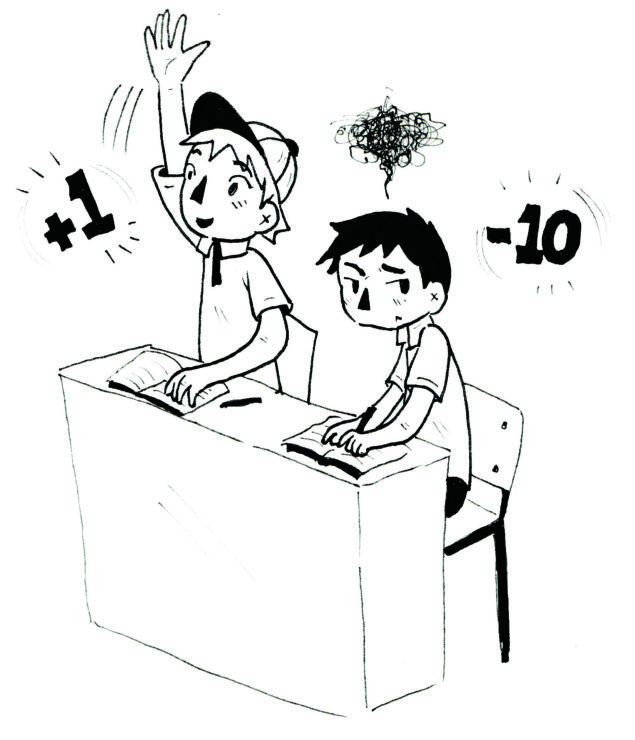Why the implementation of participation marks should be reconsidered

As a student, I find the idea of grading participation in a university lecture problematic on multiple fronts. First, given how most participation marks are structured into grading criteria, they end up taxing most students instead of rewarding those who participate. Second, grading participation is inconsistent by nature, making it difficult to grade participation fairly. Third, the higher amount of the total grade that participation gets affects in-class and cultural expectations. Overall, my three-part analysis is meant to show there are substantial objections to the use of participation marks in grading criteria.
Taxing the poor and feeding the rich
I have yet to encounter a class where participation marks are for extra credit and not worked into the overall grade. This structure is problematic because it can tax the majority of students instead of rewarding those who participate. We could say that not being taxed is a reward, but let us consider rewards as things that add beyond what a person has, not things that allow a person to fulfill their potential (as in a grade).
For small classes where participation marks are given simply for attendance, this is not a significant concern. However, when we consider moderate or large classes where participation marks are given for discussion, this is a larger issue.
Personally, I have observed that a minority of students consistently speak in class. The consistent students become the professor’s focus because — unless the professor is checking names off a list every time something is said — they are easy to remember during grading. It is not feasible in a three-hour lecture week for as low as 20 students to speak for three minutes each and for the professor to maintain pace with the syllabus. More often, a class will have five to 10 students who speak for five to 10 minutes each in a week, and six or so who ask a question infrequently. For anything more than a 15-student class, this will easily result in a minority being memorable enough to fulfill their participation requirement and the rest of the student body being deducted marks.
Of course, this is not done out of malice, but it’s a by-product of the current system. This does not even consider social anxiety or other ways that this system is stacked against many students. It may not be ideal to offer extra credit and give some students grades above 100 per cent, but it seems unjust to prioritize participation marks and tax students instead for factors beyond their control.
How well have you participated?
This then brings us to the ways in which grading participation is inconsistent. This issue is shared with other abstract grading forms — anything that is not a binary correct/incorrect test — but at least there are grading rubrics. Participation does not have an easy definition for evaluation over a term, nor is it clear how severely one student should be deducted from 100 per cent participation to another.
For attendance, there is not much consistency if missing one class equates 1/13th of the participation grade loss or one per cent of the overall grade. How many classes must one speak in to get 100 per cent for participation? Five or three? What if one speaks in the first six and doesn’t for the rest? What does 65 per cent look like in terms of participation? Does one deserve less of a mark if one is forgettable, more if they are striking?
Again, in some classes, participation is a checkable box and is not relevant to this concern. In large classes where this is not the case, simply relying on one person’s judgement or memory seems to me unfair as a base for a portion of my grade. Memories are highly subjective, and this can lead to inaccurate grading.
Is participation that significant?
You may be thinking: Well, a portion of your grade should consider participation.
The question then, is how much? I have had a range from five to 15 per cent of my overall grade based on participation in the classes I have taken. Five per cent appears small, but it is the difference between multiple letter grades if one gets a zero or a five. 15 per cent ends up being worth as much as some essays, or even half of an exam.
I disagree that my speaking in class or showing up to class is worth anything close to an essay I spent hours researching and revising, or an exam that I spent a weekend studying for. Have you ever felt prouder about attending class than getting a great grade on an essay or exam?
Participation marks are biased toward the confident, not the intelligent. Presentation skills and project-based learning are also easier if one is confident, but they require a higher degree of knowledge for evaluations. Participation marks often do not; they require engaging in front of one’s peers. I do not think that is an accurate reflection of someone’s capabilities.
The debate over participation marks is a messy one. I have had classes where participation was an easy 10 per cent of my grade, ones where participation resulted in meaningful discussion, classes where participation felt like pulling teeth, and everything in between. Despite every great case, I believe that there are substantial reasons to reconsider the implementation of participation marks across the board. I blame instructors or administration for participation marks no more than I would sports players for a faulty rule. Students want to be here to learn. I believe that we should only be graded on the outcomes from learning our material, and never our ability to do something which is not fundamental to classroom material.






